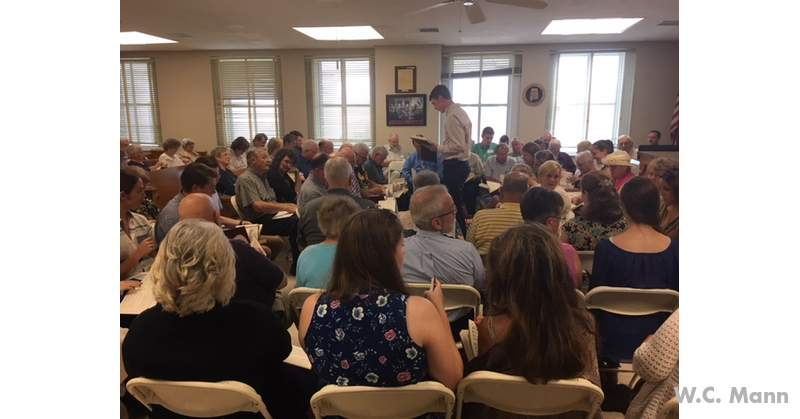Singers filled the district courtroom during last year’s convention. (W.C. Mann for The Tribune)
CULLMAN – This Saturday and Sunday, July 7-8, Cullman will celebrate what has become a unique tradition in Alabama: the state’s last courthouse singing convention. Singers from all over the state and even other parts of the country will fill the Cullman County Courthouse’s district courtroom for the 126th installment of the convention that began in 1893. Singers, listeners and the public are invited to attend.
Once a common occurrence in courthouses all over the South, Cullman’s is now the only one of its kind in the nation. Last year, event chairman and fourth-generation convention singer Henry Guthery told The Tribune, “At one time, every county had singings at the courthouse: in Alabama, Tennessee, Georgia, all over. It was really widespread, then things changed. Cullman(‘s) is the last active courthouse singing in the United States.”
Factors ranging from shifting cultural tastes and lack of interest in old-fashioned things to concerns about church-state separation led to a decline in courthouse singings over the years. Though it may not draw crowds of thousands like it used to, the tradition has managed to stay alive in Cullman.
“We have such cooperative politicians here,” said Guthery, “and the people at the courthouse are so helpful.”
Convention singers follow a long-standing form, singing from a modern edition of a songbook that dates back to the 1840s in a style known by several names:
- Shape Note Singing – The notes in the sheet music have different shapes depending on the note in the scale: round, square, triangular.
- Fa-So-La Singing – The names given to three note shapes. When the singers warm up at the beginning of a song, they’re not singing in a foreign language or speaking in tongues; they’re singing the notes by name.
- Sacred Harp – from the title of the most popular songbook used
At a fellowship gathering after day one of last year’s convention, a few singers talked about what Sacred Harp and the singing convention culture.
Butch White (Good Hope):
“I’ve been around Sacred Harp singing since I was just a boy. There was an old wood-frame church house, Valley Grove Church, adjoining our property. They had a meeting there once a month, on the fourth Saturday and Sunday. They’d have Sacred Harp singing there once or twice a year. We’d be out working in the field, and we’d hear that singing across the woods.
“It’s sacred music to most of the people that have sung it all their lives. It’s got kind of a folk thing about it now, and a lot of people follow it because it’s old-timey. But it’s sacred music to a lot of people in this part of the country. It does something for your soul if you like it.”
Tom Booth (Simcoe):
“The words just strike home. There’s an awful lot of scripture in these songs. To me, it’s worship; it’s a way of praising God for all that He does for us on a daily basis. Every breath is a gift, as far as I’m concerned, and it’s a way of returning thanks.”
Gail Doss (Nashville):
“For me, it’s contemplative, it’s soothing, it’s communal, and it’s just a good thing to do. It feels good. It’s sharing with other people and being part of something that matters.”
At a glance
126th annual Cullman Courthouse Singing Convention
Saturday and Sunday, July 7-8, 2018; from 9:30 a.m. to 2:30 p.m. both days
Cullman County Courthouse, 500 Second Ave. SW, Cullman
For veteran singers: Bring your 1991 Denson book.
For rookies: They’ve got spare books.
Copyright 2018 Humble Roots, LLC. All Rights Reserved.





















